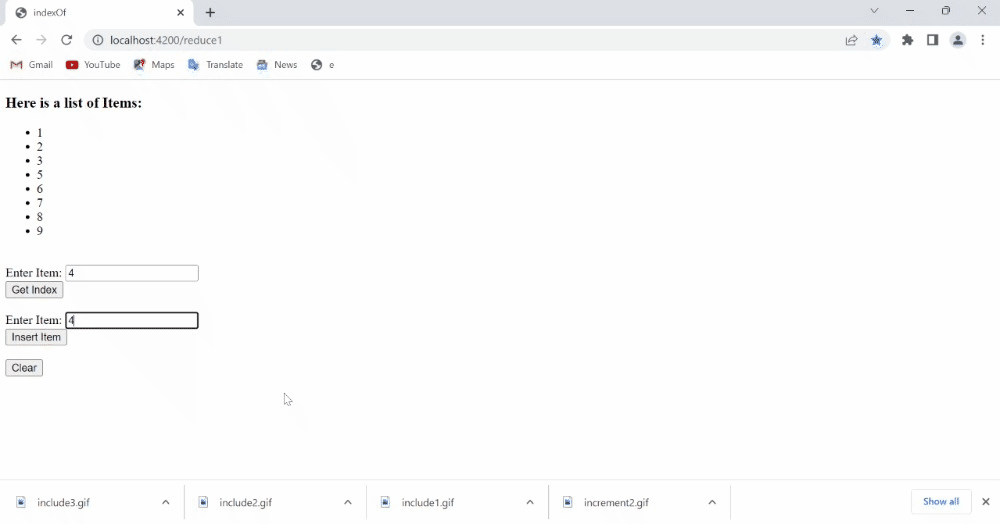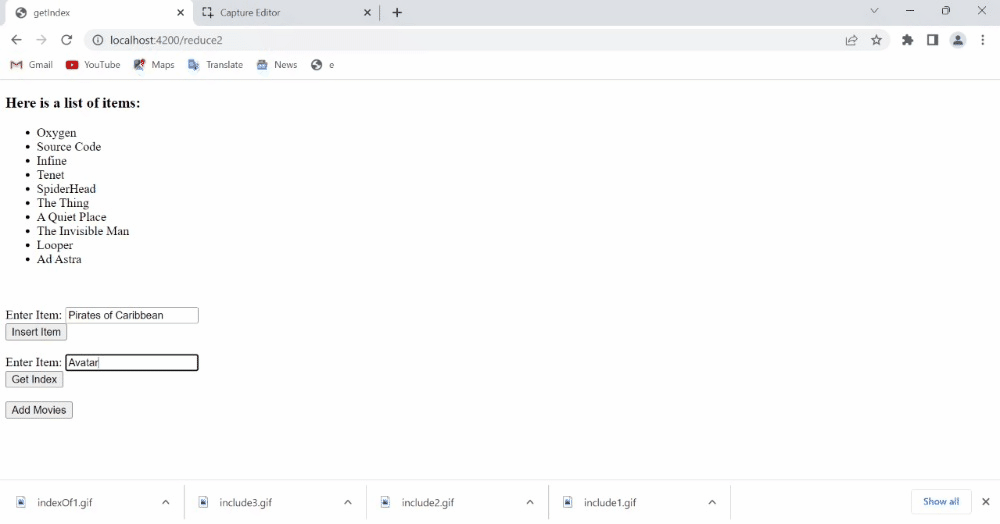Ember.js ArrayProxy indexOf() Method
Last Updated :
28 Sep, 2022
Ember.js is an open-source JavaScript framework used for developing large client-side web applications which is based on Model-View-Controller (MVC) architecture. Ember.js is one of the most widely used front-end application frameworks. It is made to speed up development and increase productivity. Currently, it is utilized by a large number of websites, including Square, Discourse, Groupon, Linked In, Live Nation, Twitch, and Chipotle.
The indexOf() method is used to get the index of the first occurrence of the value in the array.
Syntax:
indexOf( object, startAt );
Parameters:
- object: It is the item that we are searching for.
Return Value: It returns the index of the found element or -1 if it is not found.
Steps to Install and Run Ember.js:
To run the following examples you will need to have an ember project with you. To create one, you will need to install ember-cli first. Write the below code in the terminal:
npm install ember-cli
Now you can create the project by typing in the following piece of code:
ember new <project-name> --lang en
To start the server, type:
ember serve
Example 1: Type the following code to generate the route for this example:
ember generate route indexOf1
app/routes/indexOf1.js
import Route from '@ember/routing/route';
export default class ListRoute extends Route {
list = [1, 2, 3, 5, 6, 7, 8, 9];
item;
idx;
model() {
return this.list;
}
setupController(controller, model) {
super.setupController(controller, model);
controller.set('list', this.list);
controller.set('item', this.item);
controller.set('idx', this.idx);
}
}
|
app/controllers/indexOf1.js
import Ember from 'ember';
import { clear, addObject, indexOf }
from '@ember/array';
export default Ember.Controller.extend({
actions: {
insertItem(item) {
this.list.pushObject(JSON.parse(item));
},
clearList() {
this.list.clear();
},
getIndex(item) {
let res = this.list.indexOf(JSON.parse(item));
res != -1
? alert(`Index of ${item} is ${res}`)
: alert(`list does not contains ${item}`);
},
},
});
|
app/templates/indexOf1.hbs
import Ember from 'ember';
import { clear, addObject, indexOf }
from '@ember/array';
export default Ember.Controller.extend({
actions: {
insertItem(item) {
this.list.pushObject(JSON.parse(item));
},
clearList() {
this.list.clear();
},
getIndex(item) {
let res = this.list.indexOf(JSON.parse(item));
res != -1
? alert(`Index of ${item} is ${res}`)
: alert(`list does not contains ${item}`);
},
},
});
|
Output:

Ember.js ArrayProxy indexOf method
Example 2: Type the following code to generate the route for this example:
ember generate route indexOf2
app/routes/indexOf2.js
import Route from '@ember/routing/route';
export default class PartyRoute extends Route {
partyItems = [
'Oxygen',
'Source Code',
'Infine',
'Tenet',
'SpiderHead',
'The Thing',
'A Quiet Place',
'The Invisible Man',
'Looper',
'Ad Astra'
];
temp = [
'Shutter Island',
'Matrix',
'Avatar',
'Fantastic Beast',
'Avengers',
'Fantastic four',
'Hult',
'Superman',
'Spiderman',
'The Batman'
];
item;
idx;
model() {
return this.partyItems;
}
setupController(controller, model) {
super.setupController(controller, model);
controller.set('partyItems', this.partyItems);
controller.set('item', this.item);
controller.set('idx', this.idx);
controller.set('temp', this.temp);
}
}
|
app/controllers/indexOf2.js
import Ember from 'ember';
import { indexOf, pushObject, pushObjects }
from '@ember/array';
export default Ember.Controller.extend({
actions: {
insertItem(item) {
this.partyItems.pushObject( item);
},
push_item(data) {
this.partyItems.pushObjects(data);
},
getItem(item) {
let res = this.partyItems.indexOf(item);
res!=-1 ? alert(`Index of ${item} is ${res}`)
: alert(`list does not contains ${item}`);
},
},
});
|
app/templates/indexOf2.hbs
import Ember from 'ember';
import { indexOf, pushObject, pushObjects }
from '@ember/array';
export default Ember.Controller.extend({
actions: {
insertItem(item) {
this.partyItems.pushObject(item);
},
push_item(data) {
this.partyItems.pushObjects(data);
},
getItem(item) {
let res = this.partyItems.indexOf(item);
res != -1 ? alert(`Index of ${item} is ${res}`)
: alert(`list does not contains ${item}`);
},
},
});
|
Output:

Ember.js ArrayProxy indexOf method
Reference: https://api.emberjs.com/ember/4.6/classes/ArrayProxy/methods/indexOf?anchor=indexOf
Like Article
Suggest improvement
Share your thoughts in the comments
Please Login to comment...